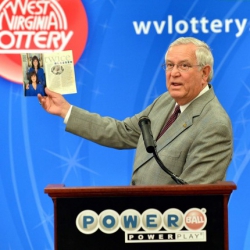The West Virginia Lottery Commission is considering introducing online gambling in the state. The lottery officials are seeking news ways to raise revenues through the lottery, due to fears of declining tax funds through a smoking ban on commercial businesses.
West Virginia’s State Lottery is facing greater competition from nearby states. The massive appeal of the multi-state lottery associations have curtailed interest in the state lotteries to some extent, so states like West Virginia are looking for ways to separate themselves. Online lottery gambling provides an opportunity to do so.
West Virginia Online Lottery Site
West Virginia Lottery Director John Musgrave says that a number of options remain on the table. Sales through a traditional online lottery site would be certain. Also being considered are laws that would allow mobile lottery gambling, as well as the software support to run mobile lottery apps in the state.
Mobile Gaming in West Virginia
To make online gambling and mobile gaming available and still remain compliant with federal law, geolocation software would be needed. Geolocation software uses GPS signals to determine where a gambler is located. Using such technology, if someone wanted to gamble on the West Virginia lottery through a desktop PC, laptop notebook, tablet computer, or mobile smartphone, they would need to be inside the boundaries of West Virginia.
If a gambler was not inside West Virginia, they simply could not play the West Virginia lottery. Even residents of West Virginia traveling out of state would not be able to use their smartphone to gamble on the WV lottery.
West Virginia Racinos
Racinos were legalized in West Virginia in 1994. The racino laws allowed lottery tickets to be sold at the state’s pari-mutuel racetracks. This boosted lottery revenues and helped the racing industry in the state remain viable.
Ten years later, the state of Pennsylvania passed similar laws. The racinos in Pennsylvania proved to be quite popular with residents, who largely stayed in-state to gamble. Pennsylvania has become the US’s second-leading state in gaming revenue.
Pennsylvania Gambling Hurt Business
The rise of Pennsylvania gaming is well-documented, because it led to a crisis for Atlantic City. Since 2006, Atlantic City has seen a steady decline of revenues, from $5.2 billion in 2006 to $2.7 billion in 2013. In 2014 alone, four Atlantic City casinos have closed their doors (or soon will). Gamblers from Pennsylvania who used to gamble in Atlantic City now stay home for gaming.
The same dynamic has affected the gambling industry of West Virginia. For the first ten years of the racinos, gamblers flocked from West Virginia’s large neighbor. Since competition was introduced, the gambling industry of West Virginia has struggled.
New Jersey Online Gambling
In 2013, New Jersey looked to online gambling to help raise revenues. While iGaming in New Jersey has been disappointing in many respects, it is expected to bring in about $55 million in tax revenue to the state of New Jersey in 2014. That’s fifty-five million dollars the taxpayers won’t have to pay, so West Virginia is intrigued by the possibilities of online gambling.
Legalizing online gambling would help West Virginia’s four racinos recover some of the money they have lost through competition with Pennsylvania. The legislative process to license and regulate online lottery gaming likely would be lengthy, but it is believed implementation once approval was given would be relatively quick and easy.
John Musgrave says the lottery commission is taking a look at all options. Musgrave said, “We’re still exploring [online gaming] because we feel that’s the way the industry’s moving, so we want to plan for it. We have not yet made any decision for how we’re going to implement it, but we are looking at it, studying it and seeing how our casinos in our jurisdiction can move in that direction. We’re still seeing a decline [in revenue]. We still are experiencing competition as the new casinos are coming on in Maryland and some in Ohio. That hasn’t plateaued.“

